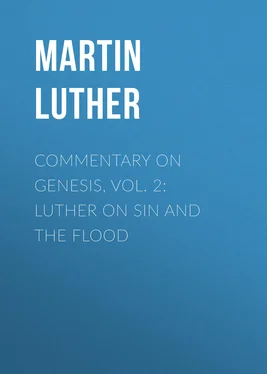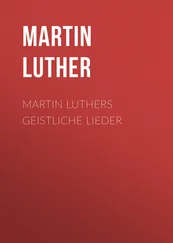Martin Luther - Commentary on Genesis, Vol. 2 - Luther on Sin and the Flood
Здесь есть возможность читать онлайн «Martin Luther - Commentary on Genesis, Vol. 2 - Luther on Sin and the Flood» — ознакомительный отрывок электронной книги совершенно бесплатно, а после прочтения отрывка купить полную версию. В некоторых случаях можно слушать аудио, скачать через торрент в формате fb2 и присутствует краткое содержание. Жанр: foreign_prose, foreign_religion, Философия, foreign_psychology, foreign_antique, на немецком языке. Описание произведения, (предисловие) а так же отзывы посетителей доступны на портале библиотеки ЛибКат.
- Название:Commentary on Genesis, Vol. 2: Luther on Sin and the Flood
- Автор:
- Жанр:
- Год:неизвестен
- ISBN:нет данных
- Рейтинг книги:4 / 5. Голосов: 1
-
Избранное:Добавить в избранное
- Отзывы:
-
Ваша оценка:
- 80
- 1
- 2
- 3
- 4
- 5
Commentary on Genesis, Vol. 2: Luther on Sin and the Flood: краткое содержание, описание и аннотация
Предлагаем к чтению аннотацию, описание, краткое содержание или предисловие (зависит от того, что написал сам автор книги «Commentary on Genesis, Vol. 2: Luther on Sin and the Flood»). Если вы не нашли необходимую информацию о книге — напишите в комментариях, мы постараемся отыскать её.
Commentary on Genesis, Vol. 2: Luther on Sin and the Flood — читать онлайн ознакомительный отрывок
Ниже представлен текст книги, разбитый по страницам. Система сохранения места последней прочитанной страницы, позволяет с удобством читать онлайн бесплатно книгу «Commentary on Genesis, Vol. 2: Luther on Sin and the Flood», без необходимости каждый раз заново искать на чём Вы остановились. Поставьте закладку, и сможете в любой момент перейти на страницу, на которой закончили чтение.
Интервал:
Закладка:
V. 8b. And it came to pass, when they were in the field, that Cain rose up against Abel his brother, and slew him.
113. Here you see the deceptive character of those alluring words. Cain had been admonished by his father with divine authority to guard against sin in the future, and to expect pardon for that of the past. But Cain despises the twofold admonition, and indulges his sin, as all the wicked do. For true is the saying of Solomon, "When the wicked cometh, there cometh also contempt, and with ignominy cometh reproach," Prov 18, 3.
114. Our ministry at the present day deserves no blame. We teach, we exhort, we entreat, we rebuke, we turn ourselves every way, that we may recall the multitude from security to the fear of God. But the world, like an untamed beast, still goes on and follows not the Word, but its own lusts, which it tries to smooth over by a show of uprightness. The prophets and the apostles stand before us as examples, and our own experience is instructive, also. Our adversaries, so often warned and convicted, know they are doing wrong, and yet they do not lay aside their murderous hate.
115. Learn, then, what a hypocrite is; namely, one who lays claim to the worship of God and to charity, and yet, at the same time, destroys the worship of God and slaughters his brother. And all this semblance of good-will is only intended to bring about better opportunities of doing harm. For, if Abel had foreseen the implacable wrath and the truly diabolical anger, he would have saved himself by flight. But as Cain betrayed no such anger, uttered a friendly greeting and manifested his usual courtesy, Abel perished before he felt any fear.
116. There is no doubt that Abel, when he saw his brother rising up against him, entreated and implored him not to pollute himself with this awful sin. However, a mind beset by Satan pays no regard to entreaties, nor heeds uplifted hands, but as a father's admonition had been disregarded, so now the brother is spurned as he pleads upon his knees.
117. Light is cast here upon the bondage to Satan by which our nature, entangled in sins, is oppressed. Hence Paul's expression, "children of wrath," Eph 2, 3, and the declaration that such are taken captive by Satan unto his will, 2 Tim 2, 26. For when we are mere men; that is, when we apprehend not the blessed seed by faith, we are all like Cain, and nothing is wanting but an opportunity. For nature, destitute of the Holy Spirit, is impelled by that same evil spirit which impelled wicked Cain. If, however, there were in any one those ample powers, or that free will, by which a man might defend himself against the assaults of Satan, these gifts would most assuredly have existed in Cain, to whom belonged the birthright and the promise of the blessed seed. But in that very same condition are all men! Unless nature be helped by the Spirit of God, it cannot maintain itself. Why, then, do we absurdly boast of free-will? Now follows another remarkable passage.
V. 9. And Jehovah said unto Cain, Where is Abel thy brother? And he said, I know not: Am I my brother's keeper?
118. Good God! into what depth of sin does our miserable nature fall when driven onward by the devil. Murder had been committed on a brother, and perhaps murdered Abel lay for days unburied. Thereupon, as Cain returned to his parents at the accustomed time, and Abel returned not with him, the anxious parents asked him: Cain, thou art here, but where is Abel? Thou hast returned home, but Abel has not returned. The flock is without their shepherd. Tell us therefore, where thy brother is. Upon this, Cain, becoming abusive, makes answer to his parents, by no means with due reverence, "I know not: Am I my brother's keeper?"
119. But it happened to Cain as to all the wicked, that by excusing himself he accused himself, according to the words of Christ, "Out of thine own mouth will I judge thee, thou wicked servant," Luke 19, 22. Also the heathen had a striking proverb among them, "A liar ought to have a good memory." Such was the judgment of heathen men, though they knew nothing of the judgment of God and of conscience, and had nothing to guide their judgment but their experience in civil affairs. And true it is that liars run much risk of being discovered and unmasked. Hence the Germans have the proverb, "A lie is a very fruitful thing." For one lie begets seven other lies, which become necessary to uphold the first lie. And yet it is impossible, after all, to prevent conscience from arousing and betraying itself at times, if not in words, then in gestures. This is proved by numberless examples. I will cite only one example here:
120. In Thuringia there is a small town in the district of Orla, called Neustadt. In this town a harlot had murdered her infant, to which she had secretly given birth, and had thrown it, after the murder, into a neighboring fishpond. Accidentally the little piece of linen in which she had wrapped the infant, brought the horrid deed to light. The case was brought before the magistrate; and as the simple men of the place knew no better means of investigating the crime, they called all the young women of the town into the town hall and closely examined them, one by one. The face and the testimony of each one of these proclaimed her innocent. But when they came to her who was the real perpetrator of the deed, she did not wait for questions to be put to her, but immediately declared aloud that she was not the guilty person. The contrast she presented to the others in making such haste to defend herself, confirmed the suspicion of the magistrates. At once she was seized by the constables and put to death.
Indeed, instances are innumerable and of daily occurrence which show that people, in their eagerness to defend themselves, accuse themselves. Sin may, indeed, lie asleep, but that word which we have just heard, is true. It lies at the door.
121. Just so in the present case. Cain thinks he has made an effectual excuse for himself by saying that he is not his brother's keeper. But does he not confess by the very word "brother" which he takes upon his lips that he ought to be his keeper? Is not that equal to accusing himself, and will not the fact that Abel is nowhere in evidence arouse the suspicion in the minds of his parents that he has been murdered? Just so also Adam excuses himself in paradise, and lays all the blame on Eve. But this excuse of Cain is far more stupid; for while he excuses his sin he doubles it, whereas the frank confession of sin finds mercy and appeases wrath.
122. It is recorded in the history of St. Martin, that when he absolved certain notorious sinners, he was rebuked by Satan for doing so. St. Martin is said to have replied, "Why, I would absolve even thee, if thou wouldst say from thy heart, I repent of having sinned against the Son of God, and I pray for pardon." But the devil never does this. For he persists in committing sin and defending the same.
123. All liars and hypocrites imitate Cain their father, by either denying their sin or excusing it. Hence they cannot find pardon for their sins. And we see the same in domestic life. By the defense of wrong-doing, anger is increased. For whenever the wife, or the children, or the servants, have done wrong, and deny or excuse their wrong-doing, the father of the family is the more moved to wrath; whereas, on the other hand, confession secures pardon or a lighter punishment. But it is the nature of hypocrites to excuse and palliate their sin or to deny it altogether and under the show of religion, to slay the innocent.
124. But here let us survey the order in which sins follow each other and increase. First of all Cain sins by presumption and unbelief when, priding himself on the privilege of his birthright, he takes it for granted that he shall be accepted of God on the ground of his own merit. Upon this pride and self-glorification immediately follow envy and hatred of his brother, whom he sees preferred to himself by an unmistakable sign from heaven. Upon this envy and hatred follow hypocrisy and lying. Though he designs to murder his brother, he accosts him in a friendly manner and thereby throws him off his guard. Hypocrisy is followed by murder. Murder is followed by the excusing of his sin. And the last stage is despair, which is the fall from heaven to hell.
Читать дальшеИнтервал:
Закладка:
Похожие книги на «Commentary on Genesis, Vol. 2: Luther on Sin and the Flood»
Представляем Вашему вниманию похожие книги на «Commentary on Genesis, Vol. 2: Luther on Sin and the Flood» списком для выбора. Мы отобрали схожую по названию и смыслу литературу в надежде предоставить читателям больше вариантов отыскать новые, интересные, ещё непрочитанные произведения.
Обсуждение, отзывы о книге «Commentary on Genesis, Vol. 2: Luther on Sin and the Flood» и просто собственные мнения читателей. Оставьте ваши комментарии, напишите, что Вы думаете о произведении, его смысле или главных героях. Укажите что конкретно понравилось, а что нет, и почему Вы так считаете.












